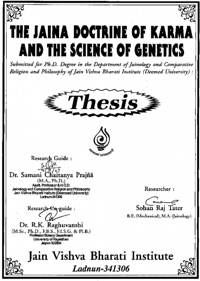Avirati (Vowelessness - Non Abstinence)
Avirati or vowlessness means not to take any vows not to commit any sins or certain sins. At present, we may not be committing any sins but it is not virati until we take vows not to commit sins. Even though we may not commit sins, the absence of vows, is a cause for the bondage of karma. Because not taking a vow or having a temptation or desire to commit sin cause the bondage of karma. If one does not want to commit a sin, then why should she/he hesitate to take a vow to prevent the bad effect? If we closely examine the proper aspects of the minds and hearts of people who don't take vows, we find that they have a desire or have the door open to create a desire to commit sins. The mind thinks "Though I will not commit this sin, sometimes, by force of circumstances, I may have to commit sins. I may commit such a sin, If I take a vow, I will have to face a serious difficulty. So let it be as it is, It me not take any vow." As long as you don't make a strong determination that in your life there will be no need to commit sins, and do not take a vow not to commit sins, the possibility of your committing sins will be there. Even the desire to commit a sins is a sin. Sins should be discarded by means of an austere vow.
For instance, though there is no possibility of your committing the sins of hunting, plundering others, eating meat etc. the bondage of karma relating to these sins ends only when you take a vow not to commit them. In an ordinary manner, Avirati or the absence of vows is of 12 kinds.
1 to 6
7 to 12Not to take vows related to the pleasures of the five senses and the mind.
Not to take vows related to the use of earth, water, fire, air and plants (vegetation) and all mobile beings (trasa). In addition included are not taking vows to discard violence, falsehood, stealing, sexual activities, attachment and taking food in the nights. Taking vows for a partial retrainment from these is called Deśa Virati (for family persons).
If a serious and solemn vow is taken with three yogas and three karaṇas i.e. if a vow is taken by person that he/she will not by mind, speech or body commit these sins that he would not get them committed by others, and would not approve them when others commit them, then it is called serva virati. This type of vow is taken by a Jaina monk. But for a family person it is impossible not to approve knowingly or unknowingly when others are committing sins as well as it is difficult to stop the sins of subtle kind. Therefore, the family persons takes partial vows which he/she can observe.
When mithyātva is conquered fully and avirati is there means pramāda, kaṣāya, yoga are definitely with him. It is there pact. And when mimiyātva and avirati are destroyed fully then pramāda, kaṣāya and yoga will remain with soul. When earlier is there means all succeeding are present with earlier.[7]
 Prof. Dr. Sohan Raj Tater
Prof. Dr. Sohan Raj Tater
 Doctoral Thesis, JVBU
Doctoral Thesis, JVBU